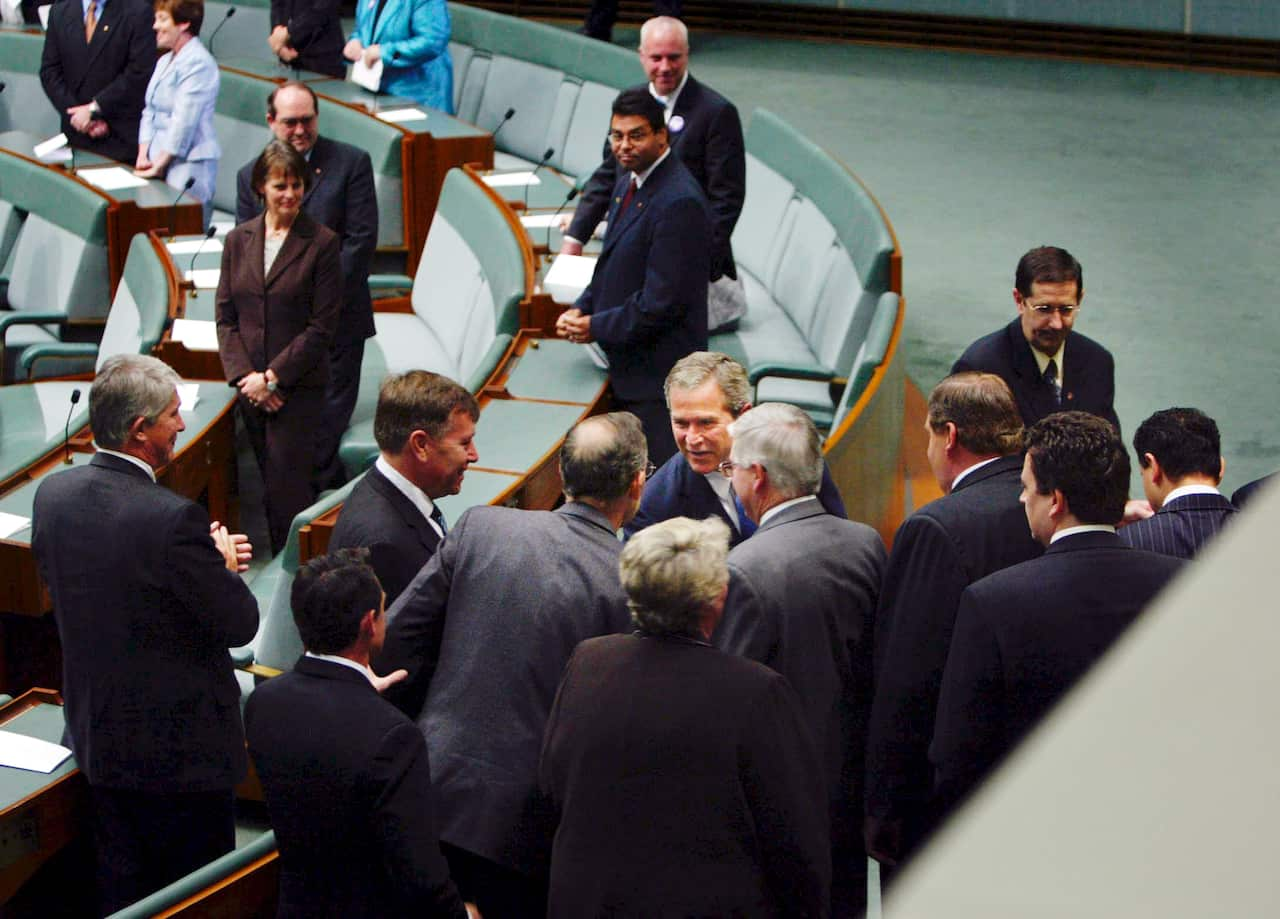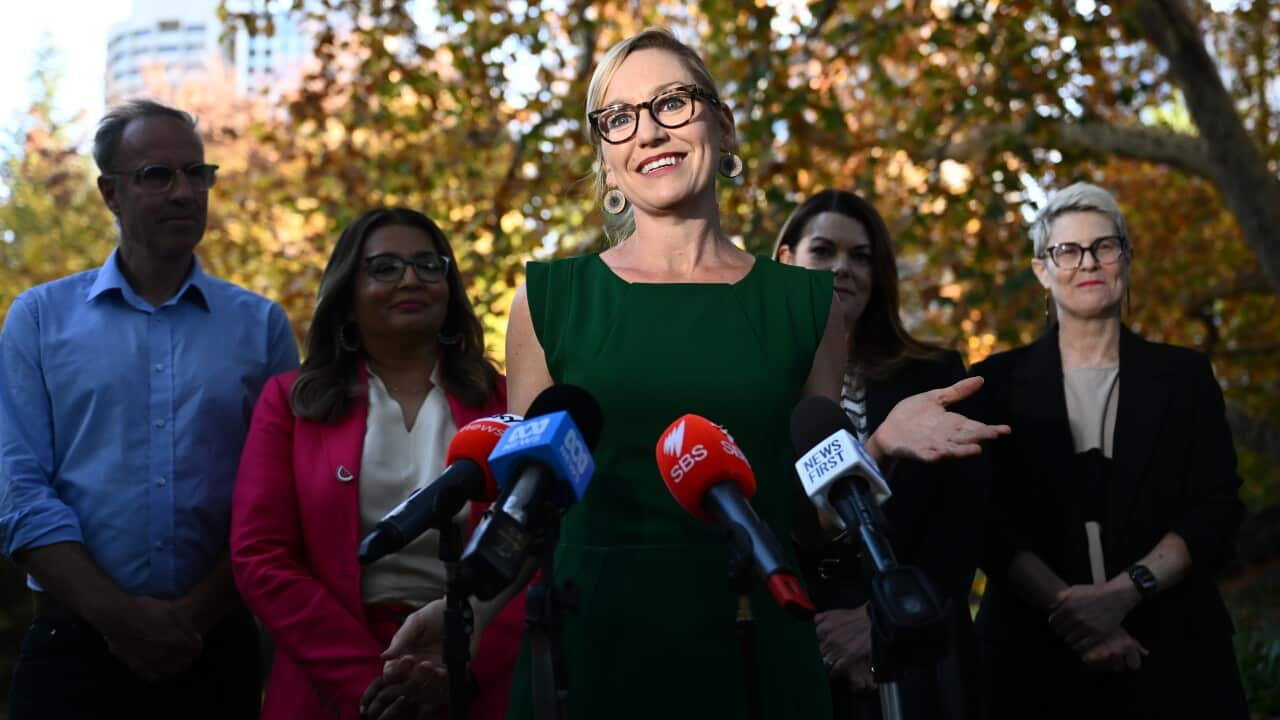Vocal opposition to Israel's attack on Gaza has been regularly cited as a reason for the Greens' poor lower-house election results, but it may have helped the party reach new voters, experts have said.
It's also a position newly elected party leader Larissa Waters has no intention of abandoning, despite criticism the minor party has strayed too far from its foundational focus on environmental protection.
Waters has argued that social issues are central to the Greens' platform, and that these can sit comfortably alongside action on climate change, free education and properly funded health care.
After winning the top job uncontested at a party-room meeting on Thursday — following the shock loss of Adam Bandt's seat of Melbourne — Waters said the Greens could "walk and chew gum at the same time".
"We certainly don't resile from our strong stance on social justice issues," the Queensland senator told the ABC's RN on Friday morning.
"We will always call out atrocities, and we will always work to make sure that people's daily needs are met and that we're looking after the planet."
Senator Waters said wanting peace in the Middle East didn't make the party antisemitic and condemned both antisemitism and Islamophobia as unacceptable.
On Friday afternoon, deputy leader Mehreen Faruqi echoed Waters' comments, and said the party had taken a "strong moral position and a position of justice".
When asked whether the Green would focus more on the environment in the Parliament, she said the two issues were connected.

"Social justice issues and environmental justice issues, are completely interlinked," she said.
"There can be no climate justice without social justice, without economic justice or racial justice. We'll continue on with that."
As the Greens face pressure to refocus on the environment, here's how the party's position on Gaza may have affected its vote and why advocating on social justice issues isn't new for the minor party.
Did the Greens' stance on Gaza lose them votes?
Despite losing three out of their four lower house seats, the Greens' primary national vote remains at roughly 12 per cent in the lower house — similar to their 2022 result.
Election analyst Ben Raue said the Greens lost support in their traditional inner-city heartlands but picked up extra votes further into suburbs where they had no chance of winning a seat.
He said that that, while Gaza wasn't one of the Greens' main election campaign items, it did help the minor party start conversations with voters who previously might not have been engaged with their platform.
"I think it has helped them crack a new voter base that they didn't previously have access to," Raue told SBS News.
"I don't think it's the primary reason why they've lost votes elsewhere, but there could be questions there about how much they prioritise that work versus other things that are closer to home."
Redbridge Group director Simon Welsh cautioned against making conclusions about diverse communities until more analysis had been done.
While he agreed the Greens' stance on Gaza swayed some voters — particularly in Muslim communities in the north of Melbourne and west of Sydney — he said the party's vote in outer suburban areas had been growing for some time.
"So the question we've got to disentangle is: was Gaza additive to that, or are we just seeing a continuation of a trend that was there before?" he told SBS news, adding that this pre-existing trend was "born more of dissatisfaction with the two major parties than it is around any sort of given issue."
Welsh said this serves as an important warning to Labor to not take these diverse communities for granted, with the ALP on track for a historic 93 seats.
Why foreign policy isn't new territory for the Greens
The Greens have a history of campaigning on both environmental and social justice issues, Raue said.
"Campaigning against armed conflict in other parts of the world is pretty typical for the Greens, and that's been around as part of their base since the beginning," he said.
"The Greens got a big boost in the membership and a big boost in the vote around the time of the Iraq War and the Tampa crisis in the early 2000s."
Former party leader Bob Brown and then-Greens senator Kerry Nettle famously heckled George W Bush in 2003, a gesture of opposition to Australia sending 2,000 troops to Iraq and Afghanistan.

Meanwhile in 2001, Brown led criticism of then-prime minister John Howard's refusal to allow asylum seekers rescued by the MV Tampa to land on Christmas Island.
Brown joined Labor and independents to vote down emergency legislation that would force the ship, which had 400 asylum seekers on board, to be removed from Australian waters.
Raue argued that under Bandt's leadership there has been an emphasis on "inequality issues closer to home", with less focus on foreign policy, human rights or refugee activism.
Pressure for Greens to use Senate power to refocus
Senator Waters, a former environmental lawyer, said she wanted the Greens to have a role in rewriting environmental protection laws, which the government has promised to pass this term.
The pledge has buoyed some environmental groups, who think the party has become overly distracted by other progressive causes.
"We think this is a welcome sign that the Greens are getting back to core business, which is protection of climate and the environment," Australian Conservation Foundation climate and energy program manager Gavan McFadzean told AAP.
"In terms of their campaigns and their public work ... it would be good for them to have a stronger focus on climate and environment this term."
The Greens have retained 11 seats in the upper house, giving them the balance of power — meaning Labor can work exclusively with the party to pass legislation.
Labor went to the 2022 election promising to fix its nature positive laws, which among other things would establish a national compliance and enforcement body to be called Environment Protection Australia.
However, the changes were shelved as it failed to reach a vote in the Senate.
"We are very keen to be able to rewrite those laws and actually protect nature and take action on the climate crisis that's wreaking so much havoc on this beautiful planet and on our lives," Waters said on Friday.
Labor could also opt to negotiate with the Coalition, which has won 26 seats, bypassing the Greens and other crossbench senators entirely.
— With additional reporting by the Australian Associated Press
For the latest from SBS News, download our app and subscribe to our newsletter.

